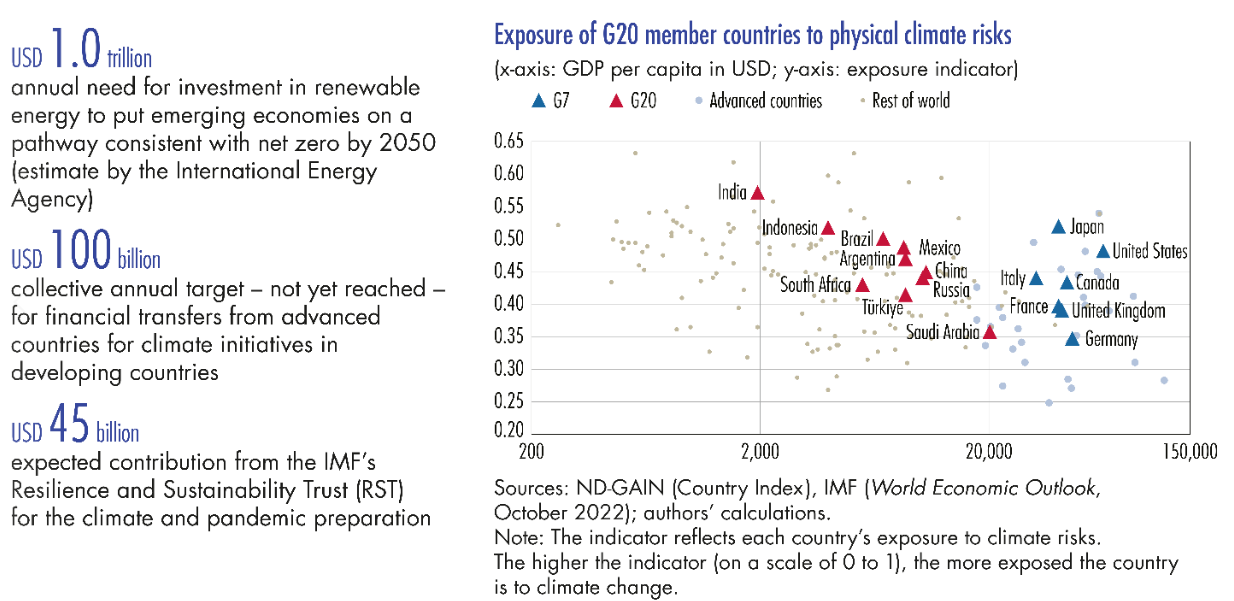
Banque de France Bulletin no. 245: Article 2 Financing the climate and ecological transition in emerging economies
The Synthesis Report of the Intergovernmental Panel on Climate Change (IPCC) Sixth Assessment Report, published on 20 March 2023, stresses the importance of financing and international cooperation in accelerating climate action. India, a major emerging economy which has held the presidency of the G20 since December 2022, has also placed the environment and financing the transition in middleincome countries among its key priorities. While emerging countries now account for the majority of CO2 emissions, their emissions are closely linked to those of advanced economies via global trade. Consequently, the international community needs to devote greater financial resources to protecting the climate, which is a global public good. Without this additional funding, financial stability, which central banks are tasked with safeguarding, could be jeopardised by disorderly, delayed or even abrupt climate transitions. The Summit for a New Global Financial Pact, to be held in Paris in June 2023, will attempt to find solutions to these issues.
This article focuses on those G20 member countries that are not advanced economies, but the issue concerns all countries classified as middle income economies by the International Monetary Fund (IMF).
1 Emerging countries: key players in the fight against climate change
Cooperation between advanced and emerging countries is necessary and legitimate
The climate is a global public good that requires commitments and cooperation from all countries. However, the pledges made under the Paris Agreement in the form of Nationally Determined Contributions (NDCs) could prove to be insufficient. Global warming is expected to reach 2.4°C in 2100, even if all the 2030 NDC targets are reached (Climate Action Tracker, 2022).
In light of this, and with climate related impacts worsening each year, multilateral action is needed to strengthen NDCs. While there is widespread agreement on this, international climate discussions are currently focusing on the issue of “international burden sharing”: Which regions or countries need to bear the cost of reinforcing climate policies? Advanced countries (which are
historically responsible for the accumulated stock of CO2) or emerging countries (which have become the main emitters of CO2)?
The notion of common but differentiated responsibilities (CBDR), set out in Principle 7 of the 1992 Rio Declaration and reiterated in all international climate treaties since the Kyoto Protocol (1997), was introduced to take account of the historically predominant role played by advanced countries in climate change. The Kyoto Protocol, for example, established a binary distinction between developed countries (known as Annex I countries) on the one hand, which had a responsibility to curb their emissions, and developing countries on the other, for which expectations regarding climate targets were reduced. However, the emergence of new high emitting countries not included in Annex I over the past 30 years has raised calls for them to be increasingly involved in
global efforts to cut emissions. The Paris Agreement attempted to change the binary distinction of the Kyoto Protocol, notably via NDCs, which require all signatory countries to set their own climate targets.
However, the national approach on which NDCs are based is not always the most appropriate: for the same volume of emissions avoided, reinforcing NDCs for emerging countries is less costly than for advanced countries (see section 1.2). …
Download the PDF version of this document

- Published on 04/03/2023
- 14 pages
- EN
- PDF (844.86 KB)
Bulletin Banque de France 245
Updated on: 04/03/2023 10:00
